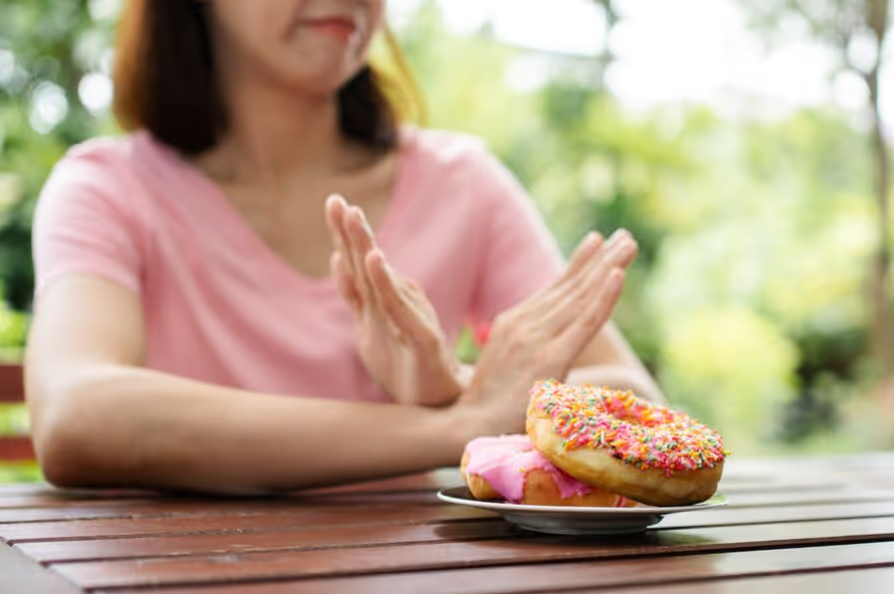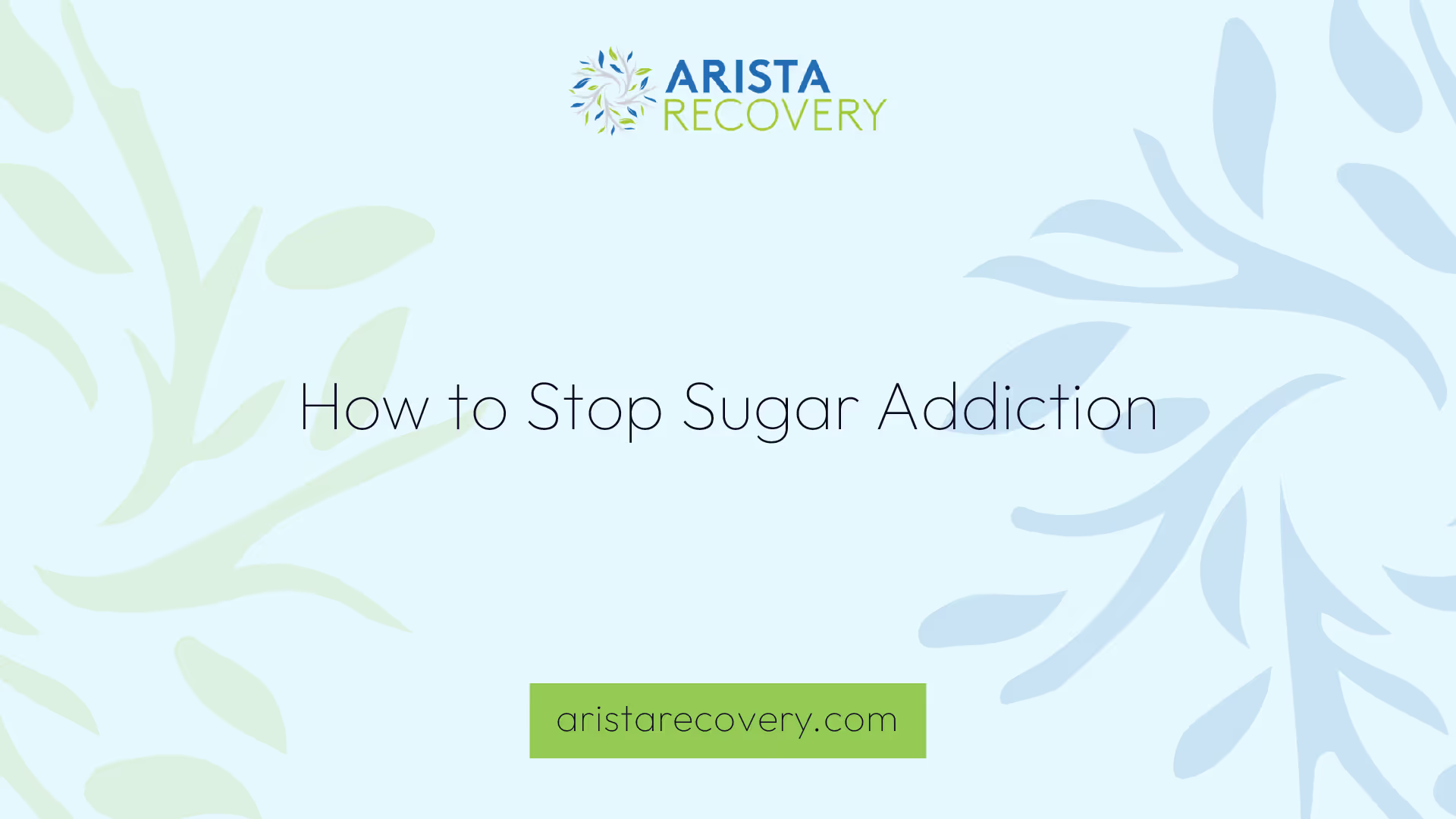How to Stop Sugar Addiction

Understanding Sugar Addiction
The Science Behind Sugar Addiction
Sugar addiction can lead to serious health conditions and even cause dependencies to form, as sugar stimulates the brain's pleasure centers. Research shows that sugar can be highly addictive, with individuals experiencing symptoms such as cravings, binging, and withdrawal. Sugar activates the opioid receptors in the brain, leading to dopamine release and resulting in a need for more sugar to achieve the same effect over time. Consistent consumption of sugary foods can lead to pathway changes in the brain, resulting in compulsive and addictive behaviors [1].
Sugar fuels every cell in the brain and is seen as a reward, reinforcing the desire for more sugar. This makes it difficult to break the habit. Moreover, sugar is scientifically constructed to make our brains love the taste of it, leading to addictive behaviors. Mindfulness training is suggested to be more effective than traditional addiction treatment programs in curbing sugar cravings [3].

Impact of Sugar on the Brain
Sugar addiction can lead to a natural form of addiction due to the activation of brain pathways that respond to natural rewards, similar to addictive drugs. Sugar releases opioids and dopamine, indicating its addictive potential. Studies show that rats can become sugar dependent under certain circumstances, exhibiting behaviors like bingeing, withdrawal, craving, and cross-sensitization, similar to drug dependency [4].
Understanding the science behind sugar addiction and its impact on the brain can help individuals and families combat this issue. For more information on overcoming various addictions, explore our articles on how to stop porn addiction, how to stop phone addiction, how to stop gambling addiction, and how to stop shopping addiction.
Strategies to Combat Sugar Addiction
Addressing sugar addiction involves understanding the underlying causes and implementing effective strategies to break the cycle. Here are some methods to help combat sugar addiction.
Weaning Off Sugar
Weaning off sugar is a recommended strategy to address sugar addiction and curb withdrawal symptoms. Gradually reducing sugar intake can help minimize cravings and prevent binging.
- Gradual Reduction: Start by cutting down on the amount of sugar added to your meals and drinks. Replace sugary snacks with healthier alternatives.
- Protein and Fiber: Lean on protein and fiber-rich foods, as they help keep you full longer and stabilize blood sugar levels [5].
- Regular Meals: Avoid skipping meals to prevent sudden drops in blood sugar levels, which can trigger sugar cravings.
Identifying Hidden Sugars
Identifying hidden sugars in foods is crucial for reducing overall sugar intake. Many processed foods contain added sugars that can contribute to addiction.
- Read Labels: Check food labels for ingredients like high fructose corn syrup, sucrose, and glucose.
- Common Culprits: Be aware of common sources of hidden sugars such as sauces, dressings, and packaged snacks.
Avoiding Artificial Sweeteners
Avoiding artificial sweeteners is another key step in combating sugar addiction. Research indicates that artificial sweeteners may be as addictive as real sugar and can worsen sugar cravings.
- Natural Alternatives: Opt for natural sweeteners like stevia or monk fruit instead of artificial ones.
- Mindful Consumption: Be mindful of the products you consume and choose those without artificial sweeteners.
Implementing these strategies can help individuals break free from sugar addiction and lead to healthier lifestyle choices. For more tips and strategies, explore our articles on how to stop porn addiction, how to stop phone addiction, and how to stop gambling addiction.
Treatment for Sugar Addiction
Addressing sugar addiction involves a multifaceted approach. Effective treatments often incorporate dietary changes, therapy, and sometimes medications. Let's explore each of these in detail.
Dietary Changes
Dietary modifications are a cornerstone in breaking the sugar addiction cycle. By focusing on balanced nutrition and mindful eating, individuals can significantly reduce their dependency on sugar.
Steps to take to break a sugar addiction include:
- Eating a balanced diet
- Not skipping meals
- Planning and prepping meals
- Making time for movement
- Getting plenty of sleep
- Drinking lots of water
- Journaling food intake
- Not eliminating non-harmful food groups
These steps help stabilize blood sugar levels and reduce cravings. Working with a dietitian can provide personalized guidance. For more on dietary approaches, see our article on how to stop phone addiction.
Therapy and Counseling
Therapy and counseling play a crucial role in treating sugar addiction. Cognitive Behavioral Therapy (CBT) and mindfulness training are particularly effective. Mindfulness training, which includes meditation, mindful walking, and mindful eating, helps individuals become aware of their addictive triggers, emotions, and withdrawal symptoms. It has been shown to be more effective compared to standard programs for other addictions.
Practicing mindfulness can help regain control over sugar cravings and emotional eating habits, fostering healthier coping mechanisms for stress and anxiety. For additional support, check out our section on how to stop gambling addiction.
Medications for Sugar Addiction
In some cases, medications may be prescribed to help manage sugar addiction. Enlisting the support of a primary care doctor or healthcare provider is an important step. They can address issues like elevated blood sugar or lipids and may prescribe anti-obesity medications to decrease appetite and cravings for sweets.
While medications are not always necessary, they can be part of a comprehensive treatment plan for those struggling with severe sugar addiction. For more on how addiction treatments can be integrated, see our article on how to stop shopping addiction.
By combining dietary changes, therapy, and medications, individuals can effectively break free from the cycle of sugar addiction.
Health Risks of Excessive Sugar Consumption
Excessive sugar consumption poses significant health risks. Understanding these risks is crucial for individuals looking to break the sugar addiction cycle.
Obesity and Metabolic Disorders
Overconsumption of sugar significantly contributes to obesity and metabolic disorders. When individuals consume large amounts of simple carbohydrates without proteins or fats, it can quickly satisfy hunger, but leave them feeling hungry again shortly after, leading to overeating [5]. The U.S. Dietary Guidelines recommend limiting added sugar intake to a maximum of 10 percent of daily calories, equivalent to 200 calories or 12 teaspoons if consuming 2,000 calories per day [8]. However, Americans average 17 teaspoons of added sugars per day, far exceeding these recommendations.
Excess sugar can inflame fat cells, causing them to release chemicals that increase weight. This can lead to conditions such as type 2 diabetes and metabolic syndrome.
Heart Disease and Diabetes
The link between excessive sugar consumption and heart disease is well-documented. High sugar intake can lead to inflammation, which stresses the heart and damages arteries, increasing the risk of heart failure, heart attacks, and strokes. Additionally, people who consume sugar-sweetened beverages tend to weigh more and have a higher risk of developing type 2 diabetes [9].
Cognitive Decline and Cancer
Excessive sugar intake is also associated with cognitive decline and certain types of cancer. High sugar levels can impair brain function and increase the risk of developing conditions such as Alzheimer's disease. Furthermore, chronic inflammation caused by too much sugar can contribute to the development of cancer cells.
Understanding these health risks is a crucial step in learning how to stop sugar addiction. By reducing sugar intake and making healthier dietary choices, individuals can significantly decrease their risk for these serious health conditions. For more information on how to tackle different types of addiction, such as how to stop phone addiction and how to stop gambling addiction, visit our related articles.
Nutritional Approaches to Curb Sugar Cravings
Foods to Fight Sugar Cravings
Certain foods can help fight sugar cravings by providing sweetness without spiking blood sugar levels and by promoting satiety. Here are some effective options:
- Berries: Blueberries, strawberries, blackberries, and raspberries are low-glycemic fruits that can satisfy a sweet tooth while balancing blood sugar. They are high in water content and fiber, which helps you feel fuller longer [8].
- Avocado: Rich in fiber and healthy fats, avocado can suppress hunger, increase meal satisfaction, and limit insulin and blood sugar spikes. Adding avocado to salads, smoothies, and other dishes can reduce the risk of type 2 diabetes and cardiovascular diseases.
- Chia Seeds: These seeds are packed with protein, fiber, and omega-3 fatty acids, which can increase satiety and reduce cravings for sugary foods. Consuming chia seeds with yogurt has been found to be effective in curbing sugar cravings.
Role of Minerals in Sugar Cravings
Mineral deficiencies can often lead to sugar cravings. Key minerals involved include:
- Magnesium: A deficiency in magnesium is linked to an increased risk of insomnia, stress, anxiety, and depression, which can drive sugar cravings. Magnesium helps convert food into energy, making it crucial for reducing the desire for sweets.
- Other Minerals: Zinc, chromium, iron, and calcium also play roles in regulating sugar cravings. Ensuring an adequate intake of these minerals can help manage and mitigate the desire for sugary foods.
Importance of Fiber and Healthy Fats
Fiber and healthy fats are essential in managing sugar cravings as they promote satiety and stabilize blood sugar levels. Here are key examples:
- Avocado: This fruit is not only rich in healthy fats but also high in fiber, making it a great addition to any meal for those looking to curb sugar cravings.
- Chia Seeds: Known for their high protein, fiber, and omega-3 fatty acid content, chia seeds can significantly help in reducing cravings for sugary foods. Adding them to yogurt or smoothies can be a practical way to incorporate them into your diet.
For more tips on how to stop sugar addiction, check out our related articles on how to stop porn addiction, how to stop phone addiction, and how to stop gambling addiction. Understanding the nutritional approaches to curb sugar cravings can be an effective step towards breaking the sugar addiction cycle.
Practical Tips to Stop Sugar Cravings
Sugar cravings can be challenging to overcome, but with the right strategies, it is possible to break free from the cycle of sugar addiction. Here are some practical tips to help curb those cravings.
Breaking Meal Patterns
One effective way to combat sugar cravings is by breaking up your meal patterns. Instead of having three large meals a day, try eating smaller portions more frequently throughout the day. This helps to keep your blood sugar levels stable and avoid sudden drops that can lead to cravings.
For example, you can have part of your breakfast in the morning and save some yogurt for a mid-morning snack. This approach can help you stay satisfied and reduce the urge to reach for sugary snacks.
Rethinking Drink Choices
Drinks can be a significant source of hidden sugars. Rethinking your drink choices is crucial in reducing sugar intake and cravings. Switching to sparkling water or plain water instead of sugary beverages like soda, lattes, or juice can make a big difference [5].
Here's a table to illustrate the sugar content in common drinks:
Opting for healthier drink alternatives can significantly reduce your overall sugar consumption.
Long-Term Strategies for Sugar Avoidance
Managing sugar cravings in the long term involves adopting strategies that prevent cravings before they start. This can be achieved through mindful eating, incorporating healthy snacks, and being patient with the process of reducing sugar intake [5].
Some long-term strategies include:
- Removing junk foods from the house
- Keeping healthy foods easily accessible
- Maintaining a balanced diet and regular exercise routine to lower the frequency of cravings (Healthline)
- Engaging in physical activities like brisk walking or running, which release endorphins, the body's natural "feel good" chemicals, to help reduce cravings (Healthline)
By following these practical tips, individuals can take control of their sugar cravings and work towards a healthier lifestyle. For more information on overcoming various addictions, check out related articles on how to stop porn addiction, how to stop phone addiction, how to stop gambling addiction, and how to stop shopping addiction.
References
[1]: https://www.addictionhelp.com/sugar/
[2]: https://www.webmd.com/diet/ss/slideshow-sugar-addiction
[3]: https://medium.com/@marc.pickren/using-mindfulness-to-break-sugar-addiction-53ea52969189
[4]: https://www.ncbi.nlm.nih.gov/pmc/articles/PMC2235907/
[5]: https://www.webmd.com/diet/features/13-ways-to-fight-sugar-cravings
[6]: https://health.clevelandclinic.org/how-to-stop-sugar-cravings
[7]: https://mybiosense.com/how-mindfulness-can-curb-sugar-cravings/
[8]: https://www.everydayhealth.com/diet-nutrition/foods-that-can-help-fight-sugar-cravings/
[9]: https://www.webmd.com/diabetes/features/how-sugar-affects-your-body
You’re not alone in this.
When mental health challenges and addiction intersect, it can feel isolating. At Arista, we offer compassionate, evidence-based, and trauma-informed care to help you heal, grow, and move forward.
Support that moves with you.
You’ve taken a brave first step. At Arista Recovery, we’re here to help you continue with best-in-class care designed for long-term healing and support.







